|
|
|
Sort Order |
|
|
|
Items / Page
|
|
|
|
|
|
|
| Srl | Item |
| 1 |
ID:
100069
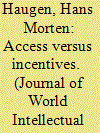

|
|
|
|
|
| Publication |
2010.
|
| Summary/Abstract |
Concerns have been expressed over the role of the World Intellectual Property Organization (WIPO) in influencing the intellectual property policies of other specialized agencies of the United Nations. This article reviews the policies of the Food and Agricultural Organization (FAO), World Health Organization (WHO) and United Nations Educational, Scientific and Cultural Organization (UNESCO), in addition to WIPO itself, and finds very interesting patterns of cooperation. While intellectual property law is primarily concerned with providing incentives for the production of new, creative and applicable arts and knowledge, human rights law is primarily concerned with providing improved access to goods crucial for human well-being and survival. While UNESCO has paid less attention to intellectual property rights over the last decades, rather emphasizing cultural preservation, both FAO and WHO have increased their focus on intellectual property rights. The latter two have increased their cooperation with WIPO, but without a formal agreement with WIPO. The article finds that WIPO, as a specialized agency, has to cooperate with specialized agencies, and there is no reason to believe that the cooperation will be in the form of a "one-way" process in which WIPO instructs the other agencies. At the same time, it must be acknowledged that intellectual property rights can also hamper research, in addition to impacting on the access to the crucial goods.
|
|
|
|
|
|
|
|
|
|
|
|
|
|
|
|
| 2 |
ID:
084511
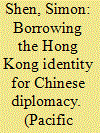

|
|
|
| 3 |
ID:
178323
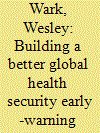

|
|
|
|
|
| Summary/Abstract |
In the years following the Severe Acute Respiratory Syndrome (SARS) outbreak in 2002–2003, the World Health Organization (WHO) created a new system for global disease outbreak surveillance. The system relied on timely reporting by nation-states and gave the WHO a leading role in the global response. It also recognized the value of a multiplicity of sources of information, including from open-source media scanning. The post-SARS system faced its most significant task with the outbreak of the COVID-19 pandemic in the People’s Republic of China and its rapid spread in 2020. The WHO architecture for early warning of disease outbreaks arguably failed and gives rise to questions about how the international community can better respond to pandemic threats in future. This article explores the inter-connectedness of Canada’s system for global health surveillance, featuring the work of the Global Public Health Intelligence Network and that of the WHO, and argues that, while Canada has positioned itself as a global leader, much work needs to be done in Canada, and globally, if the concept of collective health security and shared early warning is to be maintained in the future.
|
|
|
|
|
|
|
|
|
|
|
|
|
|
|
|
| 4 |
ID:
178170
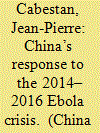

|
|
|
|
|
| Summary/Abstract |
The 2014–16 Ebola crisis in West Africa was China’s very first opportunity to demonstrate its willingness and ability to play a meaningful role in addressing public health emergencies of international concern. China’s decision to participate in the international response to the outbreak was part of an ambition to enhance its contribution to Africa’s security in general and health security in particular and to exert more influence on global norms. The specific role played by the People’s Liberation Army (PLA), especially its Academy of Military Medical Sciences, in Sierra Leone and Liberia is part of an ongoing effort to increase China’s involvement in international humanitarian assistance and disaster relief operations. It was the first time that it sent medical military teams to set up and operate infectious disease hospitals overseas. This participation also underscores the PLA’s crucial role in fighting epidemics overseas as well as at home, as the current COVID-19 pandemic illustrates. The Ebola crisis enables us to explore aspects of the PLA’s overseas missions, some of which are humanitarian and others which generally enhance China’s influence as a great power in Africa and in the world in the context of a growing Sino-US strategic competition.
|
|
|
|
|
|
|
|
|
|
|
|
|
|
|
|
| 5 |
ID:
181685
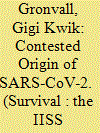

|
|
|
|
|
| Summary/Abstract |
This article describes what is known about the origin of SARS-CoV-2, with implications for policy, biological research and public-health surveillance. Theories about the origin include a natural emergence; a laboratory accident with a naturally harvested strain; an accident with a naturally harvested strain modified in a laboratory; and the deliberate creation of a biological weapon. While available scientific evidence points to a natural zoonotic event as the origin of SARS-CoV-2, this paper recommends specific steps governments and scientific institutions should take to address uncertainties about the origin of the COVID-19 pandemic, as well as to make all potential causes for a pandemic less likely to produce one in the future. Immediate steps include promoting international scientific collaboration, addressing scientific misinformation and disinformation, fully implementing ‘One Health’ and reining in the illegal wildlife trade.
|
|
|
|
|
|
|
|
|
|
|
|
|
|
|
|
| 6 |
ID:
126104
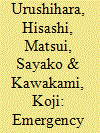

|
|
|
|
|
| Publication |
2012.
|
| Summary/Abstract |
In response to the 2009 H1N1 influenza pandemic, the governments of Japan and the United States for the first time authorized the emergency use of unapproved drugs. In this article, we comprehensively review the different regulatory approaches of Japan and the United States, countries with advanced regulatory and healthcare systems, to emergency authorization of the use of medical products as a countermeasure to public health emergencies. We outline the legal system, range of targeted products, requirements for the application dossier, legal stance for authorization, product availability, and termination of the Japanese Emergency Approval (EA), and we compare characteristics with those of the US Emergency Use Authorization (EUA). We also review the actual cases of these 2009 emergency authorizations. The Japanese EA importation of novel H1N1 influenza vaccines with adjuvant is presented, with lessons learned, and contrasted with the US EUA of peramivir.
|
|
|
|
|
|
|
|
|
|
|
|
|
|
|
|
| 7 |
ID:
118990
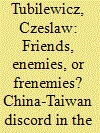

|
|
|
|
|
| Publication |
2012.
|
| Summary/Abstract |
This article examines the China-Taiwan diplomatic truce through the prism of Taiwan's post-2009 participation in the World Health Organization (WHO). It argues that Taipei's inclusion in the International Health Regulations (IHR) and its observer status at the World Health Assembly (WHA) did not signify a suspension of the cross-Strait dispute over Taipei's capacity to participate in international affairs independently of Beijing. While Taipei ostensibly sought a WHA observership to strengthen Taiwan's health security, it also wished to validate Taiwan's international legal sovereignty. Beijing, for its part, appeared to have compromised its claim over Taiwan's sovereignty by abandoning the diplomatic isolation of Taiwan in international organizations (IGOs), but in practice enforced its sovereign claim by denying Taiwan unrestricted access to activities of the WHO and other IGOs. Thus, China-Taiwan interaction on the WHO issue created a facade of cross-Strait diplomatic détente.
|
|
|
|
|
|
|
|
|
|
|
|
|
|
|
|
| 8 |
ID:
137169


|
|
|
|
|
| Summary/Abstract |
The emergency–development continuum, also known as “linking relief, rehabilitation, and development” (LRRD), has been a conceptual, institutional, and programmatic preoccupation for aid organizations and humanitarian policymakers for well over two decades. The objective of this short paper is to introduce the idea of the emergency–development continuum and, only partly ironically, to advance the notion that we should not bother with it: operationally, it has done more harm than good, driving the work of humanitarian organizations in directions that run counter to the interests of the people they are trying to serve.
|
|
|
|
|
|
|
|
|
|
|
|
|
|
|
|
| 9 |
ID:
183855
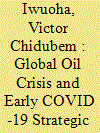

|
|
|
|
|
| Summary/Abstract |
African countries have been hit by a dual shock of COVID-19 pandemic and global oil crisis, which have caused severe economic and social disruptions. Most studies shed light on the correlates between COVID-19 and the global oil crisis, including their economic impacts on oil producing/exporting countries. However, the objective of this study is to examine the effects of the global oil crisis on the implementation of World Health Organization’s (WHO) healthcare and public health measures to contain COVID-19 in Nigeria. Empirical data from Nigeria was collected and analysed using content analysis based on WHO’s methodology. There was low level of healthcare preparedness and emergency response capacities to contain the COVID-19 pandemic. Public health measures against COVID-19 such as lockdowns and social distancing policies were poorly implemented at the expense of the people without adequate countercyclical stimulus packages and palliatives.
|
|
|
|
|
|
|
|
|
|
|
|
|
|
|
|
| 10 |
ID:
110977
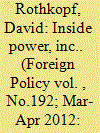

|
|
|
|
|
| Publication |
2012.
|
| Summary/Abstract |
The sales revenues of the world's largest company, Wal-Mart Stores Inc., are higher than the GDPs of all but 25 countries. At 2.1 million, its employees outnumber the populations of almost 100 nations. The world's largest investment manager, a low-profile New York company named BlackRock, manages $3.5 trillion in assets -- greater than the national reserves of any country on the planet. In 2010, a private philanthropic organization, the $33.5 billion-endowed Gates Foundation, distributed more money for causes worldwide than the World Health Organization had in its annual budget.
|
|
|
|
|
|
|
|
|
|
|
|
|
|
|
|
| 11 |
ID:
172108
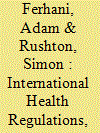

|
|
|
|
|
| Summary/Abstract |
It is often said that “diseases know no borders,” but COVID-19 has once again shown that policy responses certainly do. Governments have implemented bordering practices in a variety of ways to ensure that their own citizens are protected, even when in direct contravention to the International Health Regulations (IHR) of 2005. The IHR and the World Health Organization (WHO) have a strong preference for borders to remain open. Yet, we argue here, non-compliance by WHO member states is not the only problem with the IHR's treatment of borders. Bringing insights from critical border studies and exploring the varied ways in which the response to the COVID-19 crisis has been “bordered,” we argue that a much broader understanding of “borders” is required in the IHR and by the WHO, given that much of the exclusionary bordering we find takes place away from physical points of entry.
|
|
|
|
|
|
|
|
|
|
|
|
|
|
|
|
| 12 |
ID:
117025
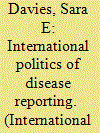

|
|
|
|
|
| Publication |
2012.
|
| Summary/Abstract |
Since the outbreak of Severe Acute Respiratory Syndrome (SARS) in 2003, there has been much discussion about whether the international community has moved into a new post-Westphalian era, where states increasingly recognize certain shared norms that guide what they ought to do in responding to infectious disease outbreaks. In this article I identify this new obligation as the 'duty to report', and examine competing accounts on the degree to which states appreciate this new obligation are considered by examining state behaviour during the H5N1 human infectious outbreaks in East Asia (since 2004). The article examines reporting behaviour for H5N1 human infectious cases in Cambodia, China, Indonesia, Thailand and Vietnam from 2004 to 2010. The findings lend strong support to the claim that East Asian states have come to accept and comply with the duty to report infectious disease outbreaks and that the assertions of sovereignty in response to global health governance frameworks have not systematically inhibited reporting compliance.
|
|
|
|
|
|
|
|
|
|
|
|
|
|
|
|
| 13 |
ID:
171090
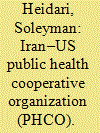

|
|
|
|
|
| Summary/Abstract |
Fars is among the largest provinces of Iran that received the most technical assistance from the American economic delegation in the 1950s. After settling in the province and during ten years of activity, the American delegation provided technical assistance in the fields of health engineering, health education, preventive medicine, nursing, medical services, and medical education. This paper explains how the technical assistance of US personnel contributed to the general health of the Fars province. The findings of this research show that after the formation of the Public Health Cooperative Organization (PHCO) in 1950, not only did most of the cities and villages of this province began to enjoy safe drinking water, but also public health improved. Additionally, the birth of children with disabilities and the spread of infectious diseases such as malaria and trachoma declined by means of preventive medicine centers and health education.
|
|
|
|
|
|
|
|
|
|
|
|
|
|
|
|
| 14 |
ID:
091836
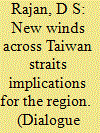

|
|
|
|
|
| Publication |
2009.
|
| Summary/Abstract |
Two extraordinary events have taken place in the recent period, symbolising the fast growing in relations between Beijing and Taipei- Taiwan's participation (Geneva, 18-27 May 2009) as an observer under the name Chinese Taipei in the World Health Assembly, the executive arm of the World Health Organization (WHO), with firm blessings from Beijing and the Chinese Communist Party (CCP) chief Hu Jintao's congratulatory telegram (27 July 2009) to the newly elected head of Taiwan's ruling Kuomintang (KMT) Ma Ying-Jeou.
|
|
|
|
|
|
|
|
|
|
|
|
|
|
|
|
| 15 |
ID:
186858
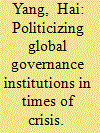

|
|
|
|
|
| Summary/Abstract |
This article examines the politicization of the World Health Organization (WHO) over the course of the coronavirus pandemic (January–December 2020), a paradigmatic case of politicization of global governance institutions. During the pandemic, the WHO was subjected to considerable scrutiny and contestation. This research focuses on politicization at the level of behavior and discourse. Conceptually, it leverages the analytic purchase of politicization and framing. Empirically, it is based on a corpus comprising 505 texts gathered from key actors involved. The analysis not only lays bare the varying demands and arguments vis-à-vis the WHO, but foregrounds the broad consensus among the actors examined (barring the Donald Trump administration) on the imperative to support the organization. Additionally, seven distinct frames on the WHO are identified: Puppet, Handcuffed, Scapegoat, Irreplaceable, Botched, Comme il faut, and Battleground. Together, they offer a holistic overview of the diverse perspectives on the WHO and its pandemic response.
|
|
|
|
|
|
|
|
|
|
|
|
|
|
|
|
| 16 |
ID:
095527
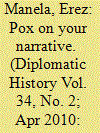

|
|
|
|
|
| Publication |
2010.
|
| Summary/Abstract |
When Dr. Viktor M. Zhdanov, Deputy Minister of Health of the Soviet Union, arrived in Minneapolis, Minnesota, in May 1958 to attend the annual meeting of the World Health Assembly (WHA), the governing body of the World Health Organization (WHO), the visit was not routine.1 Reflecting Soviet premier Nikita Khrushchev's new policy of "peaceful coexistence" with the West, it marked the first time that a Soviet delegation had been sent to that forum since the establishment of the WHO ten years earlier.2 And Zhdanov made his mark, calling on the organization to launch a global campaign to eradicate smallpox, one of humankind's oldest and deadliest diseases. Mindful of the meeting's venue, he began his call with a quote from a letter that U.S. president Thomas Jefferson had written to Edward Jenner, discoverer of the smallpox vaccine, more than a century and a half earlier. The discovery, Jefferson had written the English physician in 1806, would ensure that "future nations will know by history only that the loathsome small-pox has existed.
|
|
|
|
|
|
|
|
|
|
|
|
|
|
|
|
| 17 |
ID:
074631
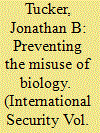

|
|
|
|
|
| Publication |
2006.
|
| Summary/Abstract |
Certain basic research ªndings in the life sciences have the potential for misuse by states or sophisticated terrorist organizations seeking to develop more lethal or effective biological weapons. The recognition of this problem has led to proposals for new systems of governance, including the international review and oversight of "dual-use" research. The case of the World Health Organization's Advisory Committee on Variola Virus Research (VAC), which oversees all research with the live smallpox virus, offers some useful lessons for assessing these proposals. This article examines how the VAC has dealt with contentious policy issues, describes the strengths and weaknesses of the oversight process, and discusses the implications for the international governance of dual-use research.
|
|
|
|
|
|
|
|
|
|
|
|
|
|
|
|
| 18 |
ID:
175395
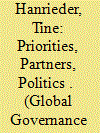

|
|
|
|
|
| Summary/Abstract |
The World Health Organization (WHO) is once more asked to reinvent itself and become more effective. This essay discusses recurrent reform proposals directed at the WHO which, in different ways, ask it to find a strategic focus and thereby its niche in the crowded global health arena. Looking back at decades of reform endeavors at the WHO, it exposes the contradictions and unresolved normative conflicts with regard to the WHO’s priorities. Ultimately, the WHO’s effectiveness hinges on Member State support for public authority in global health, and thus the political commitment to protect it against capture by special interests.
|
|
|
|
|
|
|
|
|
|
|
|
|
|
|
|
| 19 |
ID:
186893
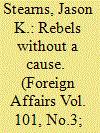

|
|
|
| 20 |
ID:
156549


|
|
|
|
|
| Summary/Abstract |
Under which conditions are principals able to regain control when agency slack has occured? While existing research highlights a number of important factors related to the conditions under which agents engage in slack, scholars have to a less extent investigated which causal mechanisms affect the ability of states to regain control of their errant agents. Extending the principal–agent literature, this contribution argues that the ability of principals to regain control of their agents depends on three causal mechanisms: the type of monitoring mechanisms; the extent of fragmentation within an international organization; and the credibility of sanctions available to member states. To illustrate this argument, I compare two cases of agency slack: at the European Commission during the Eurozone crisis in 2015; and at the World Health Organization in the 1990s. The findings suggest that regaining control of runaway agents after slack has occurred is easier when there is a low level of fragmentation within an organization and states have centralized monitoring mechanisms and credible sanction mechanisms, such as budgetary contractions, at their disposal.
|
|
|
|
|
|
|
|
|
|
|
|
|
|
|
|
|
|
|
|
|